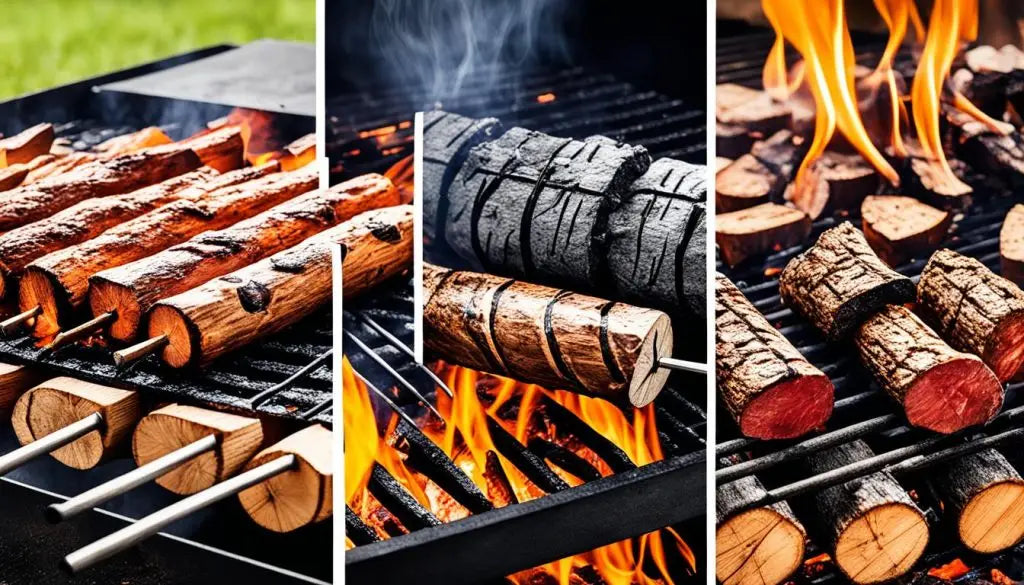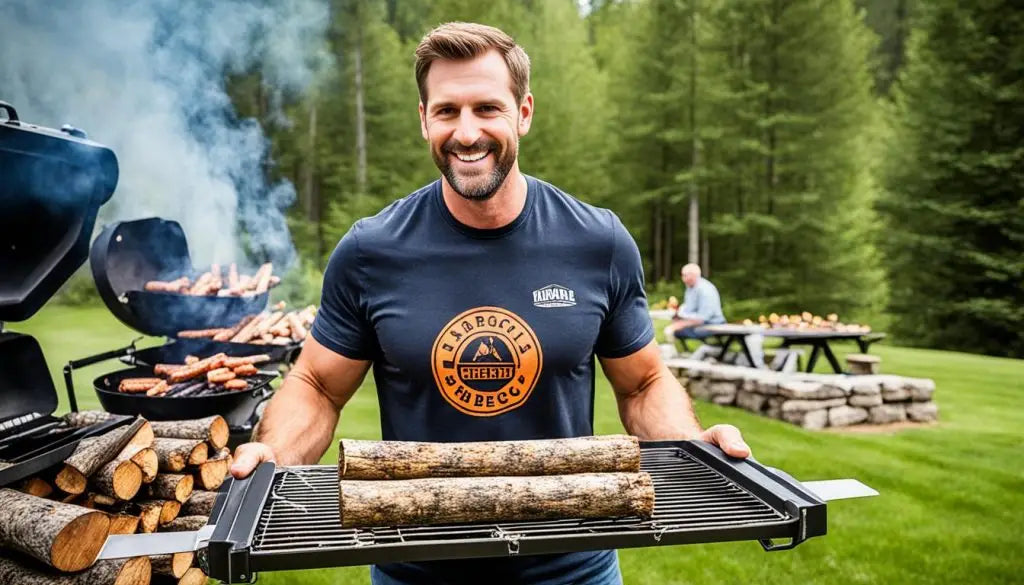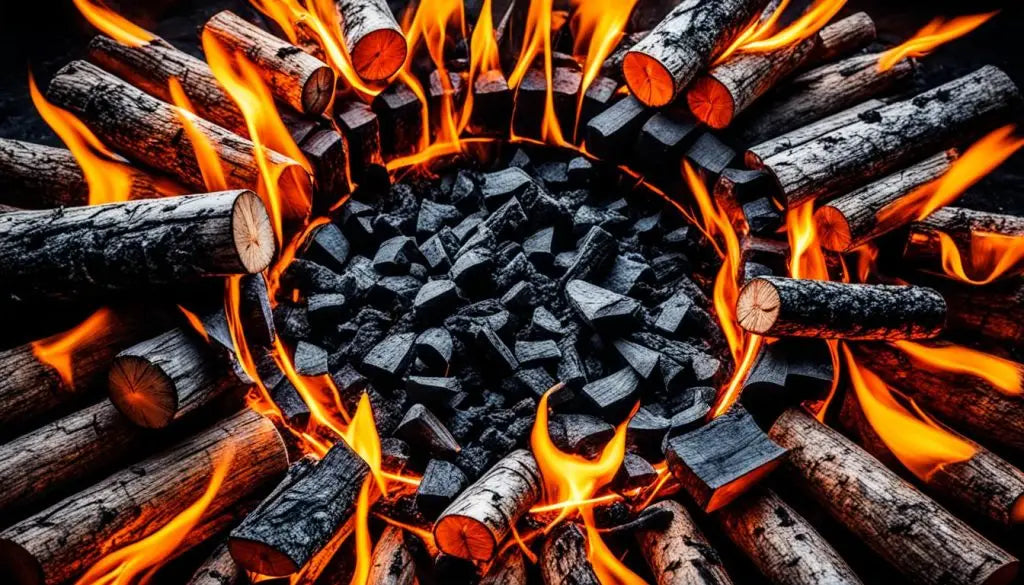On a gentle summer evening, laughter echoes as families gather, barbecues sizzling with tempting smells. This scene is a British classic, stirring feelings of nostalgia and warmth. At the heart of grilling lies a big question: which fuel is best for BBQ? The old debate between using barbecue fuel logs and charcoal is fueled by taste and the quest for perfect flavour. This piece explores both options to help you find what's best for your BBQ style.
Key Takeaways
- Charcoal offers better temperature control for versatile cooking techniques.
- Natural lumpwood charcoal is free from additives, impacting food flavour positively.
- Wood logs infuse natural flavours and are considered cleaner to handle.
- Combination of wood and charcoal maximises heat and flavour in grilling.
- Storage and transportation are easier with charcoal as it doesn’t require gas tanks.
- Choosing between logs and charcoal hinges on your desired flavour profile and cooking priorities.
Understanding Charcoal Types: Lumpwood and Briquettes
Choosing the right charcoal type is key for a great BBQ. You can pick from lumpwood charcoal and briquettes. Each one offers unique benefits that can improve your barbecuing.
Lumpwood Charcoal
Lumpwood charcoal lights fast and gets very hot. This is perfect for searing meat and adding a strong smoky taste. It comes from hardwood ash logs and burns clean and hot.
Lumpwood is great for chefs because it’s all-natural. It has no chemicals or additives, which means your food tastes pure.
Briquettes
Briquettes are shaped uniformly and burn for a long time. They're made from charcoal dust and extra ingredients. This helps give off steady heat, especially good for slow cooking.
But, the added fillers in briquettes may alter your food's flavour. This is something to think about when you compare charcoal vs wood logs for BBQ. Despite this, many people like briquettes for their convenience and consistent heat.
The Heat Factor: Charcoal and Wood Logs Compared
The type of fuel you use for barbecuing greatly changes how you cook. It's crucial to know how charcoal and wood logs work for heat control, temperature, and cook times. Each offers unique benefits for top-notch barbecue grilling.
Heat Control
Getting the right temperature for BBQ needs careful heat management. Charcoal lets you switch between intense heat and a lower, steady temperature. This flexibility is perfect for those who like to adjust the heat for different recipes. Wood logs, however, heat up slower but give a constant warmth, great for slow-cooking and adding special flavours.
Temperature Range
Charcoal gives you a wider temperature range for BBQ, making it great for searing and grilling. It heats up fast, allowing quick changes in temperature. This helps cook steaks perfectly outside and keep them juicy inside. Wood logs, though, provide a steady heat good for longer cooking times, slowly building the temperature.
Cooking Times
The choice between charcoal and wood logs also affects how long cooking takes. Charcoal heats up quicker, cutting down grill time. This is handy for fast cookouts. But wood logs last longer at a gentler heat, ideal for recipes needing slow cooking. This lets cooks choose the best fuel depending on the dish.

Flavour Profiles: How Charcoal and Logs Enhance Taste
The magic of barbecuing comes from the unique flavours the fuel adds. Knowing how different fuels change your food can make BBQs much better.
Charcoal's Smoky Flavour
Using charcoal gives a special smoky taste not found in gas grills. When lit well, charcoal makes food taste uniquely smoky. Lumpwood charcoal does this best, offering a rich smoky flavour.
Logs' Natural Aroma
On the other hand, logs bring their own flair. Woods like oak or applewood give off their own scents. These scents mix with your food, creating a prized, natural taste.
Combining Charcoal and Logs
Mixing charcoal and logs offers the ultimate BBQ experience. The smoke from charcoal and scents from logs enhance flavours. This method lets BBQ lovers try different combos for delicious results.
| Fuel | Main Flavour Contribution | Additional Benefits |
|---|---|---|
| Charcoal | Smoky, Rich | High Heat, Clean Burn |
| Logs | Natural Aroma | Subtle Flavour Infusion, Long Burn Time |
| Combination | Complex, Layered | Enhanced Taste, Customizable Flavour Profiles |
Convenience and Portability: Barbecue Fuel Logs vs Charcoal
Many prefer charcoal for convenience and portability in BBQ. You can store it in the grill, making transport easy. This is handy for mobile barbecue options. Gas grills, however, need separate, bulky gas tanks.
Logs have their benefits too. They’re bigger and neater than charcoal, making them easy to load. Depending on the wood type, like ash or oak, they can change the taste of your food.

Both types require cleaning after. Charcoal gives a smoky taste and gets very hot, but it's messier. Restaurant-grade charcoal, hotter than regular, is great for quick searing and lasts longer.
Wood logs are cleaner to handle than charcoal. This makes them a good choice for those who value neatness. The UK's increasing love for charcoal grilling shows there's a big desire for that traditional smoky flavour.
The decision between logs and charcoal boils down to what you prefer. Both have unique perks for quality charcoal and wood logs for grilling and BBQ enjoyment.
Top Quality BBQ Wood Logs: What to Look For
Choosing the right wood logs can make or break your BBQ. Good wood logs can improve both the taste of your food and your cooking experience. Knowing what to look for helps you find the best wood for your grill.
Kiln Dried Wood
Kiln dried logs are best for BBQ because they burn well. They are clean from bugs and mold, thanks to the kiln drying. They also burn hotter and more consistently, which means better cooking.
Hardwood Ash Logs
Hardwood ash logs are ideal for strong and lasting heat. They burn for more than an hour, keeping your BBQ hot. Oak wood adds a mild flavour, making your food taste better.
Knowing these details helps you pick the perfect BBQ wood logs. They ensure your food is tasty and your BBQ is fun. For more info on BBQ fuels, see this resource.
Premium Charcoal for Grilling: A Closer Look
Choosing the right premium charcoal for grilling is key. The type of charcoal used can greatly affect the taste and quality of your food. It's what gives that perfect sear and delicious flavour.
Restaurant Grade Charcoal
Restaurant grade charcoal is well-loved in the BBQ world. It burns hot and long, ideal for big meals. Chefs and home grillers alike prefer it for its steady heat.
Gower Charcoal
Gower charcoal is noted for its high quality. It provides even heat and produces little ash. This makes grilling smoother and cleanup easier.
| Features | Restaurant Grade Charcoal | Gower Charcoal |
|---|---|---|
| Heat Output | High | Consistent |
| Burn Time | Extended | Reliable |
| Purity | High | Exceptional |
Each type of premium charcoal has its benefits for grilling. Whether you pick restaurant grade charcoal or Gower charcoal depends on your grilling style and needs.
Environmental Impact of Using Charcoal and Logs
People who love barbecuing are now thinking more about how it affects our planet. The type of fuel, like charcoal or wood logs, really matters for the environment. Your choice can change the impact your BBQ has.
Sourcing and Sustainability
Where your BBQ fuel comes from is important for protecting nature. Making charcoal often means cutting down and burning trees. This can harm forests if not done right. Choosing charcoal from forests that are looked after well can help. Look for the Forest Stewardship Council (FSC) mark as a guide.
For wood logs, it’s good to pick those dried in a kiln or made of hardwood. They should also come from forests that are managed carefully. This helps cut down on harmful emissions and reduces the carbon footprint from using charcoal and logs.
Emissions and Carbon Footprint
Charcoal and wood logs both release gases that can harm the air. Charcoal usually has more of an impact because of how it’s made. This process releases a lot of carbon dioxide into the air. But, if you choose kiln-dried logs, they can be better. They burn cleaner and put less pollution into the air.
| Comparison Criteria | Charcoal | Wood Logs |
|---|---|---|
| Carbon Footprint | Higher due to production process | Lower with kiln-dried options |
| Emissions | Higher due to incomplete combustion | Lower with efficient burning |
| Sustainability | Depends on responsible sourcing | Favourable with sustainable forestry |
By choosing the right fuel, you can barbecue in a way that's better for the Earth. Making smart choices about where your BBQ fuel comes from can greatly lessen its environmental impact. This supports sustainable BBQ practices.
High-Performance Barbecue Fuel Options: Optimal Choices
When talking about barbecue fuels, it's key to look at each type's features. We'll focus on lumpwood charcoal and hardwood logs. These options will help you grill perfectly every time.

Lumpwood Charcoal Performance
Lumpwood charcoal heats up fast and is very efficient. This makes it a top pick for chefs who want control over their cooking. It is pure and keeps the food's taste natural and smoky.
Performance of Hardwood Logs
Hardwood logs are great for those who like slow-cooking. They burn longer, providing steady heat. The performance of hardwood logs also adds rich flavours to the food, thanks to their natural aroma.
| Fuel Type | Heat Production | Burn Time | Flavour Impact |
|---|---|---|---|
| Lumpwood Charcoal | Quick and intense | Moderate | Mild, Smoky |
| Hardwood Logs | Steady and prolonged | Long | Rich, Natural |
To choose the right grill fuel, understand both lumpwood charcoal performance and performance of hardwood logs. Each has its benefits. Think about what works best for your grilling style and taste preferences.
Maintenance and Cleanliness: Charcoal vs Logs
Keeping your barbecue clean is key to its lasting use and performance. Charcoal and wood logs each need different care. Knowing this can simplify cleaning after cooking, making it less tough.
Cleaning Up Charcoal Residue
Charcoal grills leave soot and ash behind. These remains from charcoal briquettes can be a lot. It's important to get rid of this ash the right way. You should wait for the grill to cool before cleaning. This prevents burns and makes collecting ash easier. Cleaning the grill grates regularly helps keep your equipment in good shape.
Managing Wood Ash
Wood logs tend to be cleaner than charcoal. They do produce ash, but it's usually not as dirty. Handling wood ash is simpler. Like with charcoal, wait for the grill to cool before cleaning up. There’s less soot to deal with than with charcoal briquettes. Keeping the barbecue clean helps it last longer and improves your grilling.
FAQ
What are the main differences between barbecue fuel logs and charcoal?
Choosing between barbecue fuel logs and charcoal depends on what you like. Charcoal lets you control the heat better and costs less. It makes grilled foods crispy outside and juicy inside. Logs, however, add a natural taste and are neater than charcoal.
What are the advantages of lumpwood charcoal?
Lumpwood charcoal is natural and has no additives. It lights quickly and gives high heat that's great for searing food and adding a smoky taste. Professionals often use it because it burns cleanly and makes food taste better.
How do briquettes differ from lumpwood charcoal?
Briquettes burn longer because they're denser and might have fillers that can change how food tastes. Lumpwood charcoal, however, is pure and burns quickly, giving off intense heat perfect for cooking.
How does heat control vary between charcoal and wood logs?
Charcoal heats up fast and can reach high temperatures, which is great for cooking meats quickly. Wood logs burn slower but keep a steady heat, ideal for longer cooking times.
What kind of flavour does charcoal impart to food?
Charcoal gives food a unique smoky taste. This flavour is a favourite for BBQ lovers and can't be matched by gas BBQs, making charcoal the go-to for tasty grilling.
How do wood logs enhance the taste of barbecued food?
Different wood types, like oak or hickory, give food special smoke flavours. Logs add a woody aroma that changes the taste of BBQ dishes in a good way.
Are kiln dried wood logs better for barbecuing?
Yes, kiln dried wood logs are best for BBQs. They catch fire easily, burn hotter, and don't have pests or mould. This makes them reliable for great tasting barbecues.
What makes restaurant grade charcoal a premium choice for grilling?
Restaurant grade charcoal is top choice because it gets very hot and burns longer. It's perfect for cooking a lot of food over time and improves the flavour and grilling experience. BBQ experts prefer it.
How does the sourcing and sustainability of charcoal and wood logs impact the environment?
It's important to buy from responsible suppliers for the environment's sake. Although charcoal and wood logs create emissions, choosing sustainable sources and eco-friendly ways to make them lessens their environmental effect.
What are the high-performance barbecue fuel options available?
For high-performance BBQs, lumpwood charcoal and hardwood logs are the best. Lumpwood charcoal suits chefs who want strong heat and better cooking control. Hardwood logs are great for slow-cooking and flavourful food.
How does one manage the cleanliness and maintenance of barbecues when using charcoal versus logs?
Using charcoal means cleaning up soot and ash. Logs, though, make less mess and simpler clean-up. Keeping grills in good condition ensures they work well for a long time.

